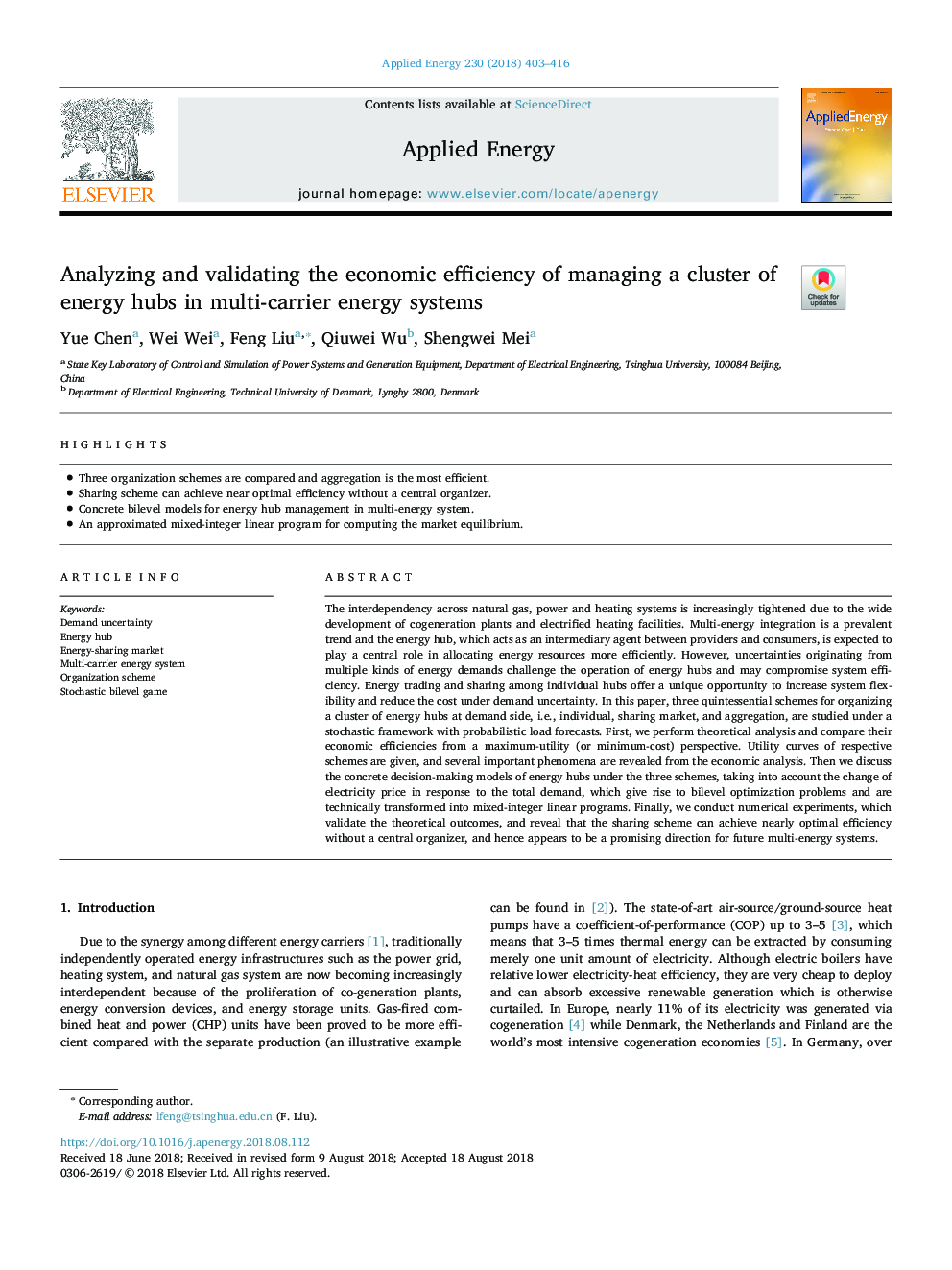| کد مقاله | کد نشریه | سال انتشار | مقاله انگلیسی | نسخه تمام متن |
|---|---|---|---|---|
| 10131322 | 1645543 | 2018 | 14 صفحه PDF | دانلود رایگان |
عنوان انگلیسی مقاله ISI
Analyzing and validating the economic efficiency of managing a cluster of energy hubs in multi-carrier energy systems
ترجمه فارسی عنوان
تجزیه و تحلیل و اعتبار بهره وری اقتصادی مدیریت خوشه ای از هاب های انرژی در سیستم های انرژی چند حامل
دانلود مقاله + سفارش ترجمه
دانلود مقاله ISI انگلیسی
رایگان برای ایرانیان
ترجمه چکیده
وابستگی متقابل در سیستم های گاز طبیعی، برق و حرارت به علت توسعه گسترده گیاهان تولید برق و تاسیسات گرمایش الکتریکی به طور فزاینده ای تشدید می شود. یکپارچگی چندگانه یک روند شایع است و انتظار می رود که مرکز انرژی، که به عنوان عامل واسطه میان ارائه دهندگان و مصرف کنندگان عمل می کند، نقش مهمی در تخصیص منابع انرژی دارد. با این حال، عدم اطمینان ناشی از انواع مختلف انرژی مورد نیاز عملیات مرکز انرژی را به چالش می کشد و می تواند کارایی سیستم را تحت تاثیر قرار دهد. تجارت انرژی و به اشتراک گذاری در میان مراکز فردی فرصت منحصر به فرد برای افزایش انعطاف پذیری سیستم و کاهش هزینه های ناشی از عدم اطمینان را ارائه می دهد. در این مقاله، سه طرح اساسی برای سازماندهی خوشه ای از هاب های انرژی در طرف تقاضا، یعنی بازار فرد، بازار به اشتراک گذاری و تجمع، تحت چارچوب تصادفی با پیش بینی بار احتمالی مورد مطالعه قرار گرفته است. اولا، ما تجزیه و تحلیل نظری را انجام می دهیم و مقادیر اقتصادی آنها را از دیدگاه حداکثر (یا حداقل هزینه) به دست می آوریم. منحنی های سودمندی از طرح های مربوطه داده شده است، و بسیاری از پدیده های مهم از تجزیه و تحلیل اقتصادی نشان داده شده است. سپس ما در مورد مدل های تصمیم گیری تصمیم گیری هاب های انرژی تحت سه طرح بحث می کنیم، با توجه به تغییر قیمت برق در پاسخ به تقاضای کل، که موجب مشکلات بهینه سازی سطوح چرمی می شود و از لحاظ فنی به برنامه های خطی مختلط تبدیل می شوند. در نهایت، ما آزمایش های عددی را انجام می دهیم که نتایج نظری را تایید می کنند و نشان می دهد که طرح به اشتراک گذاری می تواند بدون یک سازنده مرکزی به کارایی تقریبا مطلوب دست یابد و به نظر می رسد جهت های امیدوار کننده ای برای سیستم های چند بعدی انرژی باشد.
موضوعات مرتبط
مهندسی و علوم پایه
مهندسی انرژی
مهندسی انرژی و فناوری های برق
چکیده انگلیسی
The interdependency across natural gas, power and heating systems is increasingly tightened due to the wide development of cogeneration plants and electrified heating facilities. Multi-energy integration is a prevalent trend and the energy hub, which acts as an intermediary agent between providers and consumers, is expected to play a central role in allocating energy resources more efficiently. However, uncertainties originating from multiple kinds of energy demands challenge the operation of energy hubs and may compromise system efficiency. Energy trading and sharing among individual hubs offer a unique opportunity to increase system flexibility and reduce the cost under demand uncertainty. In this paper, three quintessential schemes for organizing a cluster of energy hubs at demand side, i.e., individual, sharing market, and aggregation, are studied under a stochastic framework with probabilistic load forecasts. First, we perform theoretical analysis and compare their economic efficiencies from a maximum-utility (or minimum-cost) perspective. Utility curves of respective schemes are given, and several important phenomena are revealed from the economic analysis. Then we discuss the concrete decision-making models of energy hubs under the three schemes, taking into account the change of electricity price in response to the total demand, which give rise to bilevel optimization problems and are technically transformed into mixed-integer linear programs. Finally, we conduct numerical experiments, which validate the theoretical outcomes, and reveal that the sharing scheme can achieve nearly optimal efficiency without a central organizer, and hence appears to be a promising direction for future multi-energy systems.
ناشر
Database: Elsevier - ScienceDirect (ساینس دایرکت)
Journal: Applied Energy - Volume 230, 15 November 2018, Pages 403-416
Journal: Applied Energy - Volume 230, 15 November 2018, Pages 403-416
نویسندگان
Yue Chen, Wei Wei, Feng Liu, Qiuwei Wu, Shengwei Mei,
